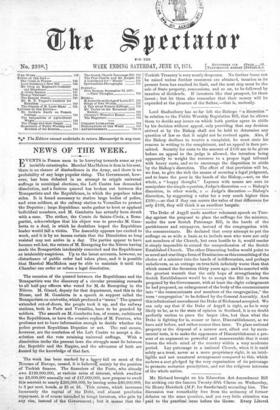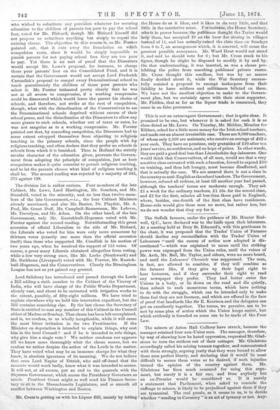Mr. Richard brought on his Education Act Amendment Bill for
striking out the famous Twenty-fifth Clause on Wednesday, Sir Henry Havelock (M.P. for Sunderland) seconding him. The discussion was remarkably free from the acrimony of former debates on the same 'question, and yet very little attention was paid to the practical issue before the Rouse. Every Liberal.
who wished to substitute any provi;iion whatever for securing education to the children of parents toe poor to pay the school fees, voted for Mr. Richard, though Mr. Richard himself did not propose to substitute anything but simply to repeal the existing clause. The objection to this course is, as Mr. Forster pointed out, that it cuts away the foundation on which compulsion rests, since it would be simply impossible to punish parents for not paying school fees they are too poor to pay. Yet there is no sort of proof that the Dissenters would accept Mr. Lowe's proposal, for instance, to charge these poor parents' fees on the Consolidated Fund, and it is certain that the Government would not accept Lord Frederick Cavendish's proposal to compel every Denominational school to teach gratuituously the children of those poor parents who select it. Mr. Forster intimated pretty clearly that he was not at all averse to compromise, if a working compromise could be discovered which would leave the parent his choice of schools, and therefore, not strike at the root of compulsion, though, what with the disinclination of the Conservatives to see the Denominational schools deprived without excuse of their school pence, and the disinclination of the Dissenters to allow any more grants to such schools, whether out of taxes or rates, he was not sanguine as to a working compromise. Mr. Forster pointed out that, by conceding compulsion, the Dissenters had to some extent estopped themselves from objecting to religio* teaching in the primary schools, since the people wish f religious teaching, and often declare that they prefer no schools schools from which it is banished. Thus in Holland the strictly secular character of the education given, prevents the Govern- ment from adopting the principle of compulsion, just as here compulsion makes it quite essential to permit religious teaching, and to let the parents choose what kind of religious teaching it shall be. The second reading was rejected by a majority of 245, 373 against 128.



































 Previous page
Previous page